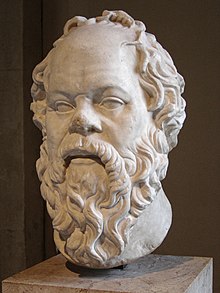
Daimonion (Socrates) (Ancient Greek δαιμόνιον daimónion, Latin genius) is the name given in ancient literature to an inner voice which, according to tradition, gave philosopher Socrates warning signs to prevent him from making wrong decisions. Socrates considered the originator of these signs to be a deity whom he did not specify. He followed the beckoning voice, which was always given without explanation and which, according to him, always proved to be useful and helpful. If the daimonion remained silent, he interpreted this as approval of his behavior. As he talked about his experiences with the inner advisor, his relationship with the mysterious entity was widely known in his hometown Athens. Opponents accused him of introducing a religious innovation. This accusation contributed to him being sentenced to death and executed in 399 BC.
Credible contemporary information on the daimonion is scarce. The main sources are descriptions by Socrates' pupils Plato and Xenophon. The phenomenon was already considered mysterious in antiquity, led to the creation of legends and gave rise to various explanations. Platonists regarded the sign giver as a high-ranking daimon, a divine spirit being that acted as the philosopher's personal guardian spirit. Christian authors saw the advisor partly as a guardian angel and partly as a malevolent demon.
In modern research, opinions differ on the interpretation of the sources. A central topic of discussion is the question of how Socrates could reconcile his claim to be guided only by reason with following unfounded advice of unclear origin.